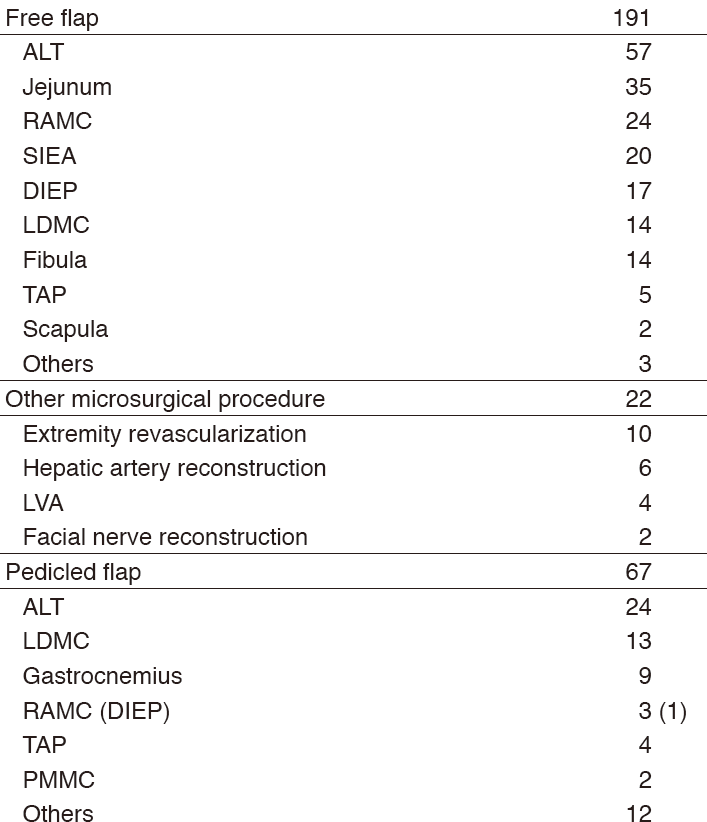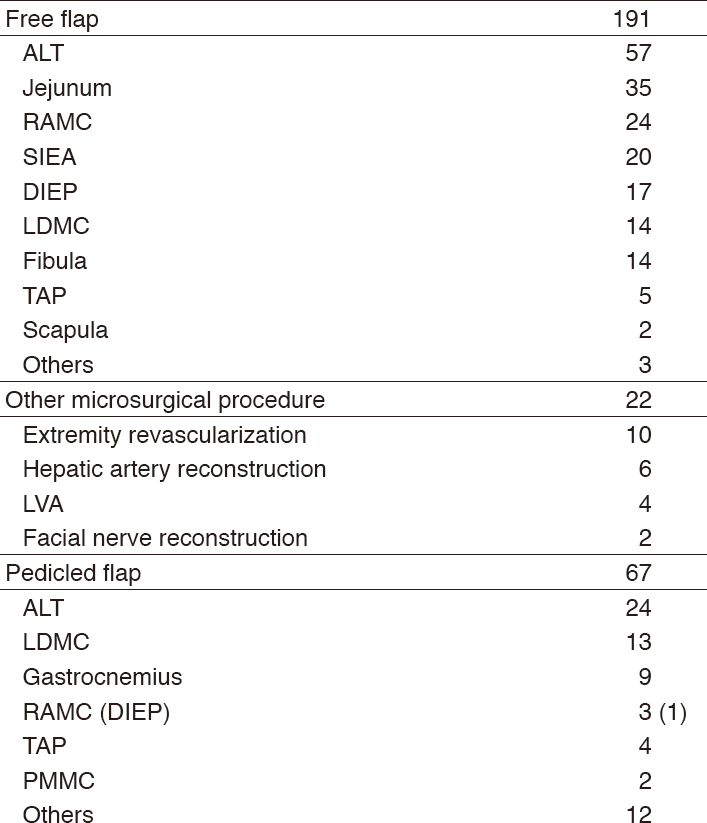Annual Report 2017
Department of Plastic and Reconstructive Surgery
Shimpei Miyamoto, Masaki Arikawa, Yu Kagaya, Kensuke Tashiro, Yukihiro Kita, Daisuke Kageyama
Introduction
The Department of Plastic and Reconstructive Surgery has mainly focused on surgical reconstruction after cancer ablation. In our institution, reconstructive procedures using free flap transfer with microvascular anastomosis are the most important operations. In addition, several methods such as tissue transfer with pedicled flaps, local flaps, skin grafts, and so forth, are used for reconstructive surgery. The objectives of reconstructive surgery are not only morphological reconstruction, but also restoration of postoperative functions after ablative surgery. The quality of life (QOL) of patients can be improved by functional and morphological reconstruction.
Our team and what we do
Six plastic surgeons cover reconstructive operations. Every week, five to ten reconstructive operations are performed. These reconstructive surgeries are performed in cooperation with surgeons from other departments of the hospital, such as Head and Neck Oncology, Breast Surgery, Musculoskeletal Oncology and Rehabilitation, Esophageal Surgery, and Dermatologic Oncology. The number of patients who receive immediate breast reconstruction is increasing. Most patients undergo breast reconstruction with a silicone implant. Limb reconstruction after limb preservation surgery has increased.
Research activities
Multi-institutional analysis of postoperative functions after microvascular tongue reconstruction is ongoing. Also, clinical research of flow-through anastomosis is ongoing.
Table 1. Reconstructive procedures

Table 2. Breast reconstructions

List of papers published in January 2017 - March 2018
Journal
1. Arikawa M, Miyamoto S, Fujiki M, Higashino T, Oshima A, Sakuraba M. Comparison of Donor Site Drainage Duration and Seroma Rate Between Latissimus Dorsi Musculocutaneous Flaps and Thoracodorsal Artery Perforator Flaps. Ann Plast Surg, 79:183-185, 2017
2. Miyamoto S. Elongation of SIEV using SCIV in breast reconstruction with an SIEA flap. Microsurgery, 37:721-722, 2017
3. Azuma S, Arikawa M, Miyamoto S. The Boomerang-shaped Pectoralis Major Musculocutaneous Flap for Reconstruction of Circular Defect of Cervical Skin. Plastic and reconstructive surgery. Global open, 5:e1579, 2017
4. Miyamoto S, Fujiki M, Nakatani F, Kobayashi E, Sakisaka M, Sakuraba M. Reconstruction of Complex Groin Defects After Sarcoma Resection. Ann Plast Surg, 78:443-447, 2017
5. Kagaya Y, Miyamoto S. Regional Oxygen Saturation Index: A Novel Criterion for Free Flap Assessment Using Tissue Oximetry. Plast Reconstr Surg, 139:1213e-1214e, 2017
6. Kagaya Y, Arikawa M, Miyamoto S. Late Arterial Thrombosis after Microvascular Head and Neck Reconstruction due to Combined Factors of Pedicle Artery Loop and Submandibular Gland Swelling. Plastic and reconstructive surgery. Global open, 5:e1446, 2017
7. Miyamoto S. Self-citation rate and impact factor in the field of plastic and reconstructive surgery. J Plast Surg Hand Surg, 52:40-46, 2018
8. Kagaya Y, Miyamoto S. A systematic review of near-infrared spectroscopy in flap monitoring: Current basic and clinical evidence and prospects. J Plast Reconstr Aesthet Surg, 71:246-257, 2018
